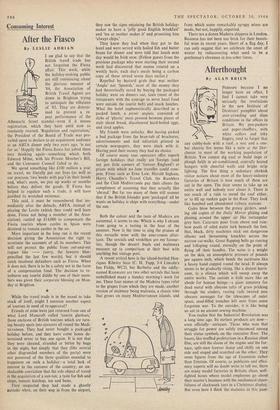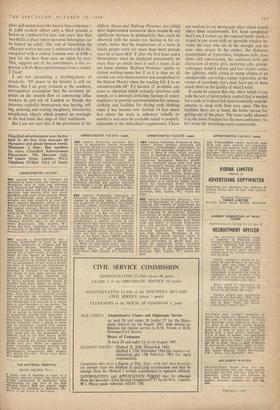Afterthought
By ALAN BRIEN
PERI Ines because I no longer have an office, I find I cannot take very seriously the revelations in the new Institute of Directors' pamphlet about over-crowding and slum conditions in the offices in Britain. We pen-pushers and paper-shufflers, with white collars and inky fingers, tend to forget that any cubby-hole with a roof, a seat and a one- bar electric fire seems like a suite at the Dor- chester to most of the working population of Britain. You cannot dig coal or build ships or plough fields in air-conditioned, centrally heated hangars with cheerful walls and bright strip lighting. The first thing a sedentary clerkish visitor notices about most of the heavy-industry factories of Britain is how much of them are out in the open. The door seems to take up an entire wall and nobody ever closes it. There is not much of a rush to mend the roof either, or to fill up sunken gaps in the floor. They look like bombed and abandoned railway stations.
Gales blow between the greasy girders, send- ing old copies of the Daily Mirror gliding and planing around the upper air like rectangular grey bats. Cataracts pour from above and rain- bow pools of oiled water lurk beneath the feet. Hot, black, ditty machines stick out dangerous elbows and threatening knuckles across the narrow cat-walks. Great flapping belts go roaring and lolloping round, eternally on the point of flying off their handles. The noise is a weight on the skin, an atmospheric pressure of pounds per square inch, which bends the eardrums like a heavy hand cupped round the head. It always seems to be gradually rising, like a distant hurri- cane, to a climax which will sweep away the entire works. The outside is little more like an abode for human beings—a giant cemetery for dead metal with obscene tufts of grass pricking through the cinders, rusting rails twisted into obscure messages for the telescopes of outer space, mud-filled trenches left over from some forgotten war. To the outsider, it is like being' an ant in an ancient sewing machine.
You realise that the Industrial Revolution was a long time ago. Its earliest products are now— even officially—antiques. Those who won that struggle for power are safely ensconced among their status symbols on the executive floor. The losers, like muffled proletarians in a Russian silent film, are still the slaves of the engine and the fur- nace, split-men forever damp and chilly on one side and singed and scorched on the other. They seem figures from the age of Eisenstein rather than Einstein. Of course, as publicists and effici- ency experts will no doubt write to tell me, there are many model factories in Britain, clean, well- lighted boxes where model employees go about their master's business with the mechanical cheer- fulness of clockwork toys in a Christmas display. But even here I think the statistics in this pam- phlet will sound more like boasts than criticisms— m 2,000 modern offices only a third provide a locker or cupboard for hats and coats; less than two-thirds a place where personal belongings can be locked up safely. The cost of furnishing the office per worker per year is estimated at £8 Gs. 8d., compared with a central London rent of £300 a year for the bare floor area on which he rests. This, suggests one of the contributors, is like ex- Pecting 'a Rolls-Royce performance from a model- T Ford.'
I am not advocating a levelling-down Of standards. 'All power to the Soviets' is still my Motto. But I do grow irritated at the southern, metropolitan assumption that the economy de- pends on the smooth flow of commuting office Workers in and out of London as though this immense capitalist bureaucracy was buying, sell- ing, ordering and costing imaginary, immaterial, ectoplasmic objects which popped up overnight in the bad lands like rings, of fairy toadstools.
But. I am not sure that if the provisions of the
Offices, Shops and Railway Premises Act (1963) were implemented tomorrow there would be any significant increase in productivity that could be observed with the naked eye. Section 6, for ex- ample, insists that the temperature of a room in which people work for more than short periods must be at least 68.8° F after the first hour and a thermometer must be displayed prominently on every floor on which there is such a room. (I do not know whether 'Railway Premises' applies to station waiting-rooms but if so it is time we all carried our own thermometers and complained to the Station Master when the reading fell .8 to an uncomfortable 68° F.) Section 21 prohibits any noise or vibration which seriously interferes with speech, or is intensely irritating. Section 12 orders employers to provide accommodation for outdoor clothing and facilities for drying such clothing when it has become wet. Section 14 lays down that where the work is sedentary (wholly or mainly) a seat must be available which is properly adjustable to the individual's requirement. I have
not worked in any newspaper office which strictly obeys these requirements. Yet, born complainer that I am, I cannot say the constant battle which is waged in any room with an openable window be- tween the man who sits in the draught and the man who sweats in the corner, the elaborate counterpoint of typewriters, telephone bells, door slams and conversation, the continual swirl and distraction of pretty girls, pestering subs, gissipy colleagues, helpful editors and lost visitors across the sightline, while sitting in damp clothes at an unadjustable seat using a jumpy typewriter on the corner of somebody else's desk, have any of them much effect on the quality of what I write.
It could be argued that any office which is run with the sort of paternalistic control that is needed for a tank of tropical fish must eventually send the inmates to sleep with their eyes open. The less facilities there are at band, the better excuse for getting out of the place. The more badly planned it is, the more freedom for the non-conformist. So let's make the workshops more comfortable.



































 Previous page
Previous page